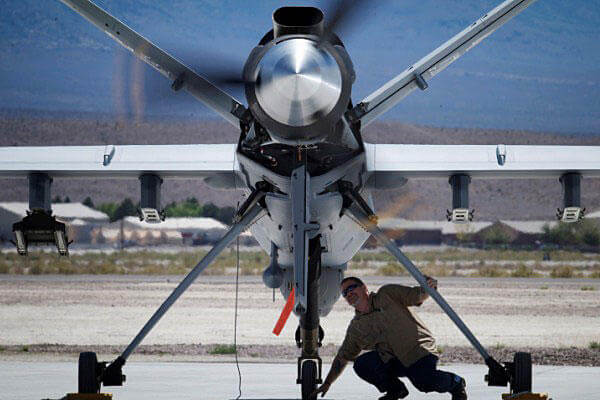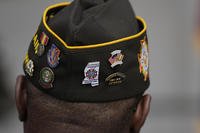U.S. warplanes hit the ISIS stronghold of Sirte in Libya in support of the Tripoli government's efforts to retake the port city, the Pentagon said Monday.
The airstrikes were authorized by President Barack Obama on the recommendation of Defense Secretary Ashton Carter and Joint Chiefs Chairman Marine Gen. Joseph Dunford, Pentagon Press Secretary Peter Cook said in a statement.
The release didn't describe the duration of the strikes, the type of aircraft used or whether they were land- or carrier-based.
The airstrikes were requested by the Libyan Government of National Accord, which is based in Tripoli and is supported by the United Nations, according to the statement. The strikes were aimed at defeating ISIS "in its primary stronghold in Libya," it said.
Efforts to retake Sirte have bogged down in recent weeks, and the U.S. will provide additional airstrikes to oust ISIS from the city, the statement said.
"GNA-aligned forces have had success in recapturing territory from ISIL thus far around Sirte, and additional U.S. strikes will continue to target ISIL in Sirte in order to enable the GNA to make a decisive, strategic advance," the statement said, using another acronym for the Islamic State of Iraq and Syria.
"These actions and those we have taken previously will help deny ISIL a safe haven in Libya from which it could attack the United States and our allies," it added.
ISIS established its primary north African base in Sirte last year, taking advantage of political upheaval in Libya following the ousting of ruler Moammar Gadhafi.
It was not the first time U.S. airstrikes targeted ISIS in Libya. In February, U.S. warplanes hit a suspected ISIS training camp west of Tripoli. Cook said at the time that the strikes "made it clear that we need to confront to ISIL wherever it rears its head."
While the airstrikes Monday indicated that the U.S. might be involved in more direct action in Libya in terms of providing more aid, advice and support to the struggling government, for now "the extent of our support is those airstrikes" on Monday, Cook said at a later news briefing.
Cook said "our assistance will be limited to strikes in this area" around Sirte, which the government forces have been trying to retake since May. The Libyan government "will be determining the pace" of U.S. airstrikes in the requests they make, he said.
Cook said a total of three U.S. airstrikes had been conducted in Syria, but Monday's airstrike marked a new phase of the campaign.
The previous airstrikes in November and February were aimed at ISIS leaders, or "high-value" targets, while Monday's airstrike was in support of Libyan government troops. The November and February strikes originated from U.S. bases in Britain. Cook declined to say where Monday's strike came from.
Libyan Prime Minister Fayez al-Sarraj said the U.S. strikes in Sirte would not be the last against ISIS to be requested by his government. In a televised statement, Sarraj, a former Housing Ministry official under Gadhafi who now doubles as head of Libya's presidency council, said that the presidency council in its role as overseer of the military requested Monday's airstrike.
"The first strikes started today in positions in Sirte, causing major casualties," Sarraj said. "This is the time for the international community to live up to its promises to the Libyan people."
Cook declined to say whether the airstrikes were carried out by drones or fixed-wing aircraft, but said the initial U.S. assessment was that an ISIS tank and two vehicles were destroyed.
The tank had been in approximately the same location for some time and had been effectively holding up the advance of government forces while also targeting civilians, Cook said.
The airstrikes requested by the Libyan government were approved by Marine Gen. Thomas Waldhauser, the new head of U.S. Africa Command, Cook said. The legal justification for the strikes came from the Authorization for the Use of Military Force enacted by Congress shortly after the Sept. 11, 2001, terror attacks.
The Obama administration has relied on the same AUMF for strikes against ISIS and al-Qaida in Libya, Iraq, Syria, Somalia and Yemen. The administration has argued for a new AUMF, but Congress has yet to act.
No U.S. troops were on the ground in Libya to act as forward controllers in spotting targets for Monday's airstrikes, Cook said. Small numbers of U.S. Special Forces have been on the ground in Libya previously in the process of "getting a picture" of the tactical situation, but there currently were no U.S. troops in Libya, he said.
In addition to U.S. Special Forces, French, British and Italian special operations forces have also been assisting Libyan forces against ISIS. Several French commandos were killed earlier this month while operating in Libya.
The U.S. had previously estimated that there might be as many as 6,000 ISIS fighters in Libya, but Cook said that the numbers had come down rapidly. He said there were now an estimated 1,000 ISIS fighters in Libya, and several hundred of those were believed to be holding Sirte.
-- Richard Sisk can be reached at Richard.Sisk@Military.com.



























